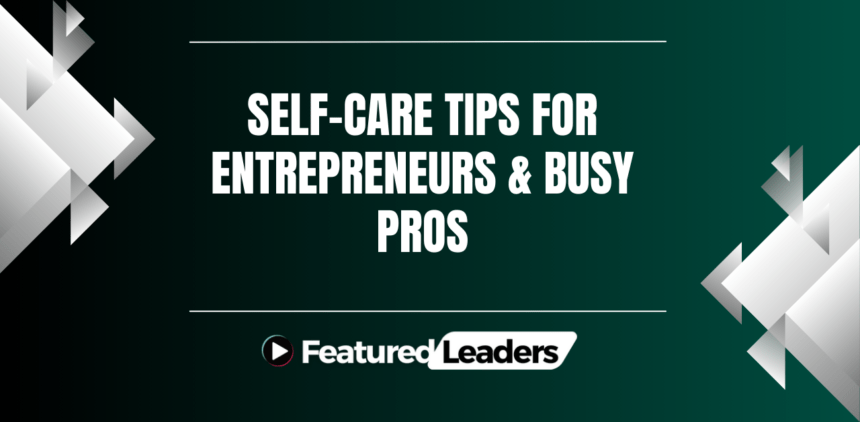Welcome to our comprehensive guide on self-care tips for entrepreneurs and busy professionals. In today’s fast-paced world, finding a balance between work and personal life can be challenging. That’s why taking care of yourself is crucial for your well-being and overall success. In this article, we will explore effective self-care strategies that can help you achieve work-life balance, reduce stress, and enhance your productivity.

Key Takeaways:
- Self-care is essential for entrepreneurs and busy professionals to maintain their well-being and achieve work-life balance.
- Neglecting self-care can lead to burnout and reduced productivity.
- Deep breathing and exercise are simple yet effective self-care techniques to reduce stress.
- Getting quality sleep, fueling your body with nutritious food, and seeking human interaction are all important aspects of self-care.
- Engaging in activities outside of work, creating a workspace you love, and treating yourself are also vital for self-care and overall well-being.
What is self-care?
Self-care is traditionally defined as self-initiated actions to stay healthy and prevent disease. It involves meeting basic needs like sleep, food, water, and human contact. However, the definition has expanded to include activities that promote emotional and relationship health. At its core, self-care is about tapping into what the mind and body truly need.
Self-care encompasses more than just taking care of physical needs. It recognizes the importance of nurturing mental and emotional well-being. It involves prioritizing activities that promote relaxation, stress reduction, and personal growth. By practicing self-care, individuals can achieve a state of holistic well-being, where all aspects of their health are nurtured.
Meeting basic needs is the foundation of self-care. Getting enough sleep, eating nutritious food, staying hydrated, and maintaining social connections are crucial for overall well-being. When these basic needs are met, individuals are better equipped to handle the challenges and demands of their daily lives.
“Self-care is giving the world the best of you, instead of what’s left of you.”
Basic needs in self-care
In the context of self-care, basic needs refer to the fundamental requirements for optimal physical, mental, and emotional health. These needs include:
- Quality sleep: Getting enough restorative sleep is essential for rejuvenation and cognitive function.
- Nutritious food: Fueling the body with a balanced diet supports overall health and energy levels.
- Hydration: Drinking an adequate amount of water is crucial for proper bodily functions.
- Human contact: Building and maintaining meaningful relationships provides emotional support and a sense of belonging.
By attending to these basic needs, individuals can establish a solid foundation for holistic self-care.
Don’t forget to breathe
In the midst of our busy lives, it’s easy to forget the power of something as simple as breathing. But did you know that deep breathing is a highly effective self-care technique? By practicing controlled and mindful breathing, you can reduce stress, promote relaxation, and support your overall well-being.
When we take slow, deep breaths, it sends a signal to our body to activate the relaxation response. This helps slow down the heart rate, stabilize blood pressure, and calm the nervous system. It’s a natural and accessible way to manage stress and find inner peace.
One effective way to develop deep breathing habits is through practices like yoga and meditation. These ancient techniques are rooted in the power of breath and can help us cultivate a more mindful and intentional way of breathing. By incorporating deep breathing exercises into our daily routine, we can enhance our self-care practice and boost our stress management skills.
The Benefits of Deep Breathing
Deep breathing has a multitude of benefits for both our physical and mental well-being. Here are a few key advantages:
- Stress reduction: Deep breathing activates the parasympathetic nervous system, which promotes relaxation and counteracts the effects of stress.
- Mood enhancement: Deep breathing increases oxygen flow to the brain, helping to improve mood, increase mental clarity, and boost energy levels.
- Enhanced focus: By focusing our attention on our breath, we can train our mind to be more present and improve our concentration and productivity.
- Improved immune function: Deep breathing stimulates the lymphatic system, which plays a vital role in removing toxins from the body and supporting immune health.
To reap the benefits of deep breathing, it’s essential to make it a regular practice. Take a few moments each day to find a quiet space, sit comfortably, and focus on your breath. You can experiment with different techniques such as diaphragmatic breathing, box breathing, or alternate nostril breathing to find what works best for you.
Remember, self-care is about nourishing all aspects of your being, and deep breathing is a powerful tool to add to your self-care arsenal. Take a deep breath, exhale slowly, and allow yourself to experience the transformative effects of this simple yet profound practice.
Minimize stress through exercise
Regular exercise is not only beneficial for physical health but also plays a crucial role in reducing stress and improving overall well-being. Engaging in aerobic exercise for a minimum of 150 minutes per week can have significant positive effects on stress levels and mental clarity. It is recommended to incorporate small bursts of physical activity throughout the day to further enhance the stress-reducing benefits.
Exercise offers a wide range of benefits that directly contribute to stress reduction. Here are some of the key advantages:
- Improved cognitive function: Regular aerobic exercise promotes blood flow to the brain, enhancing cognitive function and boosting mental clarity.
- Lowered blood pressure: Engaging in regular exercise helps lower blood pressure, reducing the risk of cardiovascular diseases and improving overall heart health.
- Enhanced productivity: Exercise increases energy levels, improves focus, and helps manage stress, leading to enhanced productivity both in professional and personal life.
Additionally, exercise stimulates the release of endorphins, which are natural mood-boosting hormones. These endorphins promote feelings of happiness and satisfaction, alleviating stress and anxiety.
It’s important to find an exercise routine that suits your preferences and lifestyle. Whether it’s jogging, biking, swimming, dancing, or any other form of aerobic exercise, consistency is key to reap the long-term benefits.
“Exercise is a natural and effective way to combat stress. It not only improves your physical health but also boosts your mood and overall well-being.”
– Dr. Alex Johnson, Fitness Expert
Are you wondering how exercise can fit into your busy schedule? Here are some practical tips:
- Start with small goals and gradually increase the intensity and duration of your exercise routine.
- Choose activities that you enjoy, as it increases the likelihood of sticking to your routine.
- Find creative ways to incorporate physical activity into your day, such as taking the stairs instead of the elevator or going for a walk during your lunch break.
- Consider joining a fitness class or finding a workout buddy to stay motivated and accountable.
Remember, exercise is not just about physical fitness; it also has a profound impact on your mental and emotional well-being. Incorporating regular aerobic exercise into your routine can significantly reduce stress levels and contribute to a more balanced and fulfilling life.
Get better sleep
Quality sleep is vital for your self-care routine and overall health. It plays a significant role in improving your decision-making ability and enhancing creativity. When you establish a consistent sleep routine and ensure you get enough rest, you can increase your energy levels and promote optimal cognitive function. Additionally, incorporating power naps into your day can be incredibly beneficial for replenishing energy and boosting productivity.
Having a good sleep quality is essential for maintaining your physical and mental well-being. It allows your body and mind to recharge, making you more alert and focused during the day. By prioritizing your sleep routine, you can optimize your self-care practices and enhance your overall quality of life.

Tips for Improving Sleep Quality:
- Create a calming bedtime routine that signals your body it’s time to wind down.
- Avoid using electronic devices, such as smartphones or tablets, before going to bed as the blue light can disrupt your sleep pattern.
- Ensure your sleep environment is dark, quiet, and comfortable.
- Invest in a supportive mattress and pillows that cater to your individual needs for the most restful sleep.
- Avoid consuming caffeine or heavy meals close to bedtime, as they can interfere with your sleep.
- Practice relaxation techniques, such as deep breathing or meditation, to calm your mind before sleep.
By incorporating these strategies into your sleep routine, you can improve your sleep quality and reap the benefits of a well-rested mind and body.
Fuel up to increase energy
Proper nutrition is essential for maintaining energy levels and supporting overall well-being. When it comes to self-care, healthy eating and a balanced diet play a crucial role in promoting physical and emotional well-being.
Listening to your body’s needs and eating when hungry is an important practice. This means nourishing your body with nutrient-dense foods that provide essential vitamins, minerals, and energy. Incorporating a variety of fruits, vegetables, whole grains, lean proteins, and healthy fats into your meals can help fuel your body and boost energy levels.
Choosing a balanced diet for holistic well-being
A balanced diet not only fuels your body but also supports emotional well-being. Including foods that contribute to positive mood and mental health can have a significant impact on your overall well-being. For example, omega-3 fatty acids found in fatty fish, nuts, and seeds are known to support brain health and help regulate emotions.
It’s important to remember that self-care is not about following extreme diets or depriving yourself. Allowing yourself indulgences and enjoying your favorite treats in moderation is an essential part of maintaining a healthy relationship with food and your emotional well-being.
“Eating a balanced diet not only provides the necessary nutrients for our bodies to function optimally but also supports our emotional well-being. It’s about nourishing both the physical and emotional aspects of our health.”
The importance of emotional well-being
Emotional well-being is closely tied to what we eat. Certain nutrients, such as vitamins B and D, have been shown to have a positive impact on mood and mental health. Prioritizing foods rich in these nutrients can contribute to emotional well-being and help manage stress and anxiety.
Additionally, practicing mindful eating can enhance your emotional connection to food. Taking the time to savor the flavors and textures of your meals can bring a sense of enjoyment and satisfaction, further promoting emotional well-being.
By prioritizing healthy eating and maintaining a balanced diet, you can increase your energy levels, support your overall well-being, and contribute to your emotional health.
Seek human interaction
Entrepreneurs often work alone, dedicating long hours to their businesses. While this independence offers flexibility and control, it can also lead to feelings of loneliness and isolation. To combat this, it’s crucial for entrepreneurs to seek meaningful human connections and prioritize social interaction.
One way to foster social connection is by joining local entrepreneur groups or networking events. These gatherings provide opportunities to meet like-minded individuals, share experiences, and build supportive relationships. Additionally, working from coffee shops or co-working spaces can create a sense of community and provide regular opportunities for social interaction.
Maintaining strong relationships with friends and family is another important aspect of combating loneliness. Make time to nurture these connections through regular check-ins, outings, or shared activities. Even during busy periods, prioritizing personal relationships is essential for overall well-being.
In today’s digital age, technology can bridge the gap when face-to-face interaction is not possible. Utilize phone calls or video chats to connect with loved ones or professional contacts. Virtual meetings and conferences offer valuable networking opportunities and allow for collaboration with peers.

Benefits of Social Connection
Establishing and maintaining social connections has numerous benefits for entrepreneurs:
| Benefits of Social Connection |
|---|
| Decreases feelings of loneliness and isolation |
| Provides emotional support and understanding |
| Offers fresh perspectives and ideas |
| Opens doors to collaboration and potential business opportunities |
| Enhances overall well-being and happiness |
“Connection is why we’re here; it is what gives purpose and meaning to our lives.” – Brené Brown
By prioritizing social connection, entrepreneurs can combat loneliness, find support, and expand their professional networks. Investing in relationships leads to a more fulfilling and balanced life, ultimately benefiting both personal and professional endeavors.
Engage in activities outside of work
Engaging in activities and hobbies outside of work is crucial for self-care and achieving work-life balance. Pursuing interests and hobbies brings joy and relaxation, allowing the mind to recharge and foster creativity. Whether it’s traveling to new destinations, immersing oneself in nature, playing a musical instrument, or joining a hobby group, allocating time for non-work activities is essential for overall well-being.
Engaging in hobbies provides a much-needed break from work-related stress and responsibilities. It allows individuals to focus on activities they are passionate about, providing a sense of fulfillment and satisfaction. Hobbies also promote a sense of accomplishment and personal growth, boosting self-esteem and overall well-being.
Having a diverse range of hobbies can help individuals explore different interests, broaden their horizons, and develop new skills. Whether it’s painting, gardening, photography, cooking, or playing sports, hobbies provide an outlet for creativity and self-expression.
Moreover, participating in activities outside of work can strengthen social connections and foster meaningful relationships. Joining hobby groups or clubs allows individuals to meet like-minded people and engage in shared experiences. This social interaction not only enhances personal connections but also provides an opportunity to network and build valuable relationships.
It’s important to prioritize hobbies and carve out dedicated time for them in the daily or weekly routine. This dedicated time should be treated as non-negotiable, just like work-related commitments. Setting boundaries and sticking to them ensures that leisure activities are not overlooked or neglected.
By engaging in activities outside of work, individuals can achieve a healthier work-life balance. Hobbies provide a sense of relaxation and rejuvenation, helping to reduce stress and improve overall well-being. So, take the time to pursue your passions and indulge in activities that bring you joy and fulfillment. Your mind, body, and work-life balance will thank you!
| Hobbies | Benefits |
|---|---|
| Traveling | Provides new experiences, broadens horizons, and reduces stress |
| Playing a musical instrument | Enhances creativity, improves cognitive skills, and promotes relaxation |
| Gardening | Increases time spent outdoors, promotes mindfulness, and reduces anxiety |
| Cooking | Allows for self-expression, fosters creativity, and provides a sense of accomplishment |
| Playing sports | Improves physical fitness, boosts mood, and promotes teamwork |
Create a workspace you love
Designing a workspace that promotes comfort, productivity, and well-being is an essential aspect of self-care. A thoughtfully organized and aesthetically pleasing workspace can have a significant impact on your overall work experience. By considering factors such as lighting, furniture ergonomics, and personal touches, you can create a workspace that not only boosts your productivity but also enhances your well-being.
Proper Lighting
Good lighting is crucial for maintaining focus and reducing eye strain. Natural light is ideal, as it promotes a sense of alertness and enhances mood. Position your desk near a window or use task lighting that mimics natural light. Avoid fluorescent lighting, as it can cause headaches and fatigue.
Ergonomic Furniture
Investing in ergonomic furniture can make a significant difference in your comfort and physical health. Consider a chair that provides proper lumbar support and is adjustable to your height and body type. A desk that allows for proper arm and wrist positioning can also prevent strain injuries. Don’t forget to adjust your chair and desk to the correct height for optimal ergonomics.
Personal Touches
Adding personal touches to your workspace can make it feel more inviting and inspiring. Decorate your desk with items that bring you joy, such as plants, photographs, or artwork. Surrounding yourself with meaningful objects can create a positive and motivating environment.
Designing a workspace that reflects your personality and preferences can cultivate a sense of ownership and pride. When you feel connected to your workspace, it becomes a space where you can thrive creatively and professionally.
Create a Boundary
Creating a physical and mental boundary between your work and personal space is crucial for maintaining work-life balance. Designate a specific area or room solely for work-related activities, if possible. This separation helps create a psychological distinction between work time and personal time, reducing burnout and allowing you to fully disconnect from work when needed.
By designing a workspace that caters to your needs and preferences, you are setting yourself up for success. A well-crafted workspace fosters productivity, promotes well-being, and enhances your overall work experience, contributing to your personal and professional growth.
Treat yourself—you deserve it
Self-indulgence is an essential component of self-care. It’s about recognizing and celebrating your accomplishments, no matter how big or small. Whether you’ve achieved a major business milestone or completed a challenging task, taking the time to acknowledge and reward yourself is crucial for maintaining motivation and self-worth.
When it comes to self-indulgence, there are countless ways to treat yourself. Consider scheduling a relaxing massage to ease tension and rejuvenate your body. Alternatively, ordering takeout from your favorite restaurant can provide a well-deserved break from cooking. Indulging in a beloved hobby or activity, such as painting or hiking, can also be a rewarding way to celebrate your dedication and hard work.
Setting goals and rewarding yourself along the way is another powerful way to practice self-indulgence. For each milestone you achieve, whether it’s landing a new client or surpassing a revenue target, give yourself a special reward. This could be as simple as treating yourself to a fancy coffee or purchasing a small luxury item you’ve had your eye on. By recognizing your accomplishments and treating yourself, you reinforce your self-worth and cultivate a positive mindset for continued success.
Self-Indulgence Ideas:
- Plan a spa day and enjoy pampering treatments
- Indulge in a favorite dessert or treat
- Take a day off to relax and do activities you love
- Book a weekend getaway to unwind and recharge
- Buy yourself a thoughtful gift that brings you joy
Remember, self-indulgence is not selfish—it’s an important part of self-care that replenishes your energy, boosts your morale, and helps you maintain a healthy work-life balance. So, go ahead and treat yourself—you deserve it!
Check in with your mental health
Regularly checking in with your mental health is crucial for self-care. As an entrepreneur, you may experience mood swings, feelings of depression, and a loss of motivation. It’s essential to prioritize your mental well-being to ensure you can show up as your best self for your business.
Mental health awareness should be a top priority for every entrepreneur. Building a strong support system and practicing self-care activities can help maintain your mental well-being. Surround yourself with positive influences, whether it’s through close friends, family, or like-minded peers.
Self-care activities play a significant role in promoting mental well-being. Engage in activities that bring you joy and relaxation. Hobbies such as painting, reading, or practicing mindfulness can help reduce stress and improve your overall well-being.
“Taking care of your mental health is not a sign of weakness but a sign of strength.”
However, some situations may require professional help. It’s important to recognize when it’s time to seek professional assistance. Therapists or counselors can provide the necessary guidance and support to help you navigate through challenging times and develop effective coping strategies.
Incorporate mental health practices into your routine
Implementing mental health practices into your daily routine is essential for maintaining well-being. Consider the following strategies to support your mental health:
- Practice regular exercise to reduce stress and boost endorphins.
- Take breaks throughout the day to recharge and refocus your mind.
- Practice mindfulness and meditation to foster a sense of inner calm.
- Engage in activities that bring you happiness and fulfillment.
- Set boundaries between work and personal life to maintain a healthy work-life balance.
Remember, seeking professional help is a sign of strength, not weakness. Prioritizing your mental health allows you to show up as your best self, both personally and professionally.
Conclusion
Self-care is crucial for entrepreneurs and busy professionals to maintain their well-being and achieve a healthy work-life balance. By prioritizing self-care, individuals can reduce stress, enhance overall productivity, and improve their overall quality of life. Taking small steps towards nurturing physical, mental, and emotional health can have long-term benefits for personal and professional success.
It’s important to remember that self-care is not a luxury but a necessity. Entrepreneurs often find themselves focused on their work and neglecting their own needs. However, neglecting self-care can lead to burnout and decreased performance. By incorporating self-care strategies into daily routines, individuals can create space for relaxation, rejuvenation, and self-reflection.
Whether it’s engaging in regular exercise, getting quality sleep, seeking human interaction, or treating oneself, self-care should be an integral part of every entrepreneur’s life. By making self-care a priority, entrepreneurs can navigate the challenges of their demanding careers while maintaining their physical and mental well-being. Remember, investing in self-care is an investment in both personal and professional success.
FAQ
What is self-care?
Self-care is defined as self-initiated actions to stay healthy and prevent disease. It encompasses meeting basic needs like sleep, food, water, and human contact, as well as activities that promote emotional and relationship health.
How can deep breathing help with self-care?
Deep breathing is a simple yet effective self-care technique. By practicing controlled and mindful breathing, it is possible to reduce stress, promote relaxation, slow down the heart rate, and stabilize blood pressure. Yoga and meditation practices can assist in developing deep breathing habits.
What are the benefits of exercise for self-care?
Regular exercise has numerous benefits for self-care, including stress reduction and improved physical and mental well-being. Engaging in aerobic exercise for at least 150 minutes per week can boost cognitive function, lower blood pressure, and enhance overall productivity. Incorporating small bursts of physical activity throughout the day can also have positive effects on stress levels.
How does quality sleep contribute to self-care?
Quality sleep is crucial for self-care and overall health. It improves decision-making ability, enhances creativity, and promotes optimal cognitive function. Establishing a sleep routine and ensuring adequate rest can increase energy levels. Power naps can also be beneficial for replenishing energy during the day.
How does proper nutrition support self-care?
Proper nutrition is essential for maintaining energy levels and supporting overall well-being. By listening to the body’s needs and eating when hungry, choosing a balanced diet that nourishes both the physical and emotional aspects of health. It’s important to avoid extreme diets and allow yourself indulgences as part of self-care.
Why is seeking human interaction important for self-care?
Entrepreneurs often work alone, which can lead to feelings of loneliness. It’s important to seek meaningful human connections and interact with others regularly. This can be done by joining local entrepreneur groups, working from coffee shops, or maintaining strong relationships with friends and family. Phone calls or video chats can also serve as a substitute when face-to-face interaction is not possible.
How can engaging in activities outside of work contribute to self-care?
Engaging in activities and hobbies outside of work is crucial for self-care and achieving work-life balance. Pursuing interests and hobbies brings joy and relaxation, allowing the mind to recharge and foster creativity. Whether it’s travel, playing an instrument, or joining a hobby group, allocating time for non-work activities is essential for overall well-being.
How does creating a workspace you love contribute to self-care?
Designing a workspace that is comfortable and inspiring is an important aspect of self-care. A well-organized and aesthetically pleasing workspace can enhance productivity and overall well-being. Factors like proper lighting, ergonomic furniture, and personal touches that make the workspace enjoyable are important considerations. Creating a boundary between work and personal space is also crucial.
How can treating yourself be a part of self-care?
Treating yourself is an integral part of self-care. It involves acknowledging and celebrating accomplishments, big or small. Self-indulgence reinforces self-worth and provides motivation to continue striving for success. It’s important to set goals and reward yourself along the way. Whether it’s scheduling a massage, ordering takeout, or indulging in a favorite activity, treating yourself is an important aspect of self-care.
Why is checking in with mental health important for self-care?
Regularly checking in with your mental health is crucial for self-care. Entrepreneurs are susceptible to mood swings, depression, and loss of motivation. Establishing a support system, practicing self-care activities, and seeking professional help when needed are vital for maintaining mental well-being. Prioritizing mental health allows entrepreneurs to show up as their best selves for their business.






